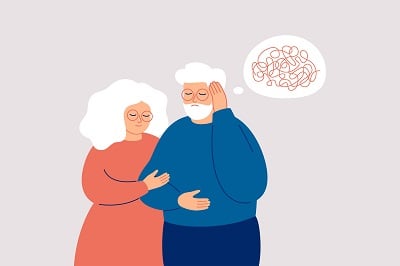“Over 20% of adults aged 60 and over suffer from a mental or neurological disorder (excluding headache disorders).”
Source: World Health Organization

Many older adults are at an increased risk of developing mental health issues such as anxiety and/or depression, neurological disorders, substance use problems, as well as other health conditions.
Thankfully, there is a large reservoir of resources that offer help and support.
Depression is a treatable medical condition—like diabetes or hypertension—and not a normal part of aging, though older adults are at higher risk of experiencing depression.1 Depressive symptoms in older adults often arise as a result of health problems, bereavement, and loss of social contact. According to the National Institutes of Health, almost 5% of seniors have experienced a major depressive disorder episode in the last year.
On the other side, until recently, doctors believed that anxiety disorders declined with age. But experts now recognize that aging and anxiety are not mutually exclusive: anxiety is as common among the old as among the young. Generalized anxiety disorder (GAD) is the most common anxiety disorder among older adults, though anxiety disorders in this population are frequently associated with traumatic events such as a fall or acute illness.
Have an aging parent or relative? Learn about tips to facilitate conversations about anxiety.
For older adults who are suffering from increased anxiety, stress, or general mental health, it is important to seek help.
Treatment Resources:
Additional website resources 2
Support groups:
Grief or loneliness:
Substance use disorder:
- Call the Substance Abuse and Mental Health Services Administration (SAMHSA) hotline at 1-800-662-4357
Suicide prevention:
Worried about an aging parent or relative? Talking to older parents or loved ones about changes in their lives is one of the best ways to find out about problems.
Ask about any changes you notice in the following areas:
- Daily routines and activities. Is Grandma refusing to do routine activities or avoiding social situations she once enjoyed?
- Worries. Does Dad seem to have more worries than before? If so, do those worries seem out of proportion to reality (such as a real threat to his safety)?
- Medication. Has Mom recently started taking another medicine? Is she using more of a particular medication than before? Side effects, such as breathing problems, irregular heartbeat, or tremors, can simulate symptoms of anxiety. An increased use of medication or alcohol may indicate an attempt to self-medicate.
- Because some medications may worsen symptoms, it's always best to discuss them with a doctor.
- Overall mood. Depression and anxiety often occur together. Tearfulness, apathy, and a loss of interest in formerly enjoyable activities are possible signs of depression.
Seek treatment for anxiety symptoms; cognitive-behavioral therapy (CBT) and medications are effective.
Here are tips to help a family member manage anxiety and stress.
- Aging With Anxiety, ADAA blog post by Julie Erickson PhD
- State of the Science: Intervention for Anxiety in Older Adults, On-Demand webinar (for mental health professionals)
- Mental Illness Among Older Adults, Co-sponsored professional on-demand webinar with the National Behavior Council
- Depression Across The Lifespan, ADAA blog post by Susan Gurley, Executive Director
- Reducing Suicide Risk, ADAA blog post by Suma Chand, PhD
- Can Cognitive Behavioral Therapy Help with Neurological Disorders?, ADAA On-Demand webinar by Suma Chand, PhD
- What is Psychological Trauma?, ADAA On-Demand webinar by Christiane Blanco-Oilar, PhD
- Reducing Suicide Risk, ADAA On-Demand webinar by Suma Chand, PhD
- Coronavirus Anxiety Resources
References:
- Centers for Disease Control and Prevention (CDC). (2021, January). Depression is Not a Normal Part of Growing Older. CDC.gov. https://www.cdc.gov/aging/depression/index.html
- National Alliance on Mental Illness (NAMI). (2021, September). COVID-19 Resource and Information Guide. NAMI.org. https://www.nami.org/Support-Education/NAMI-HelpLine/COVID-19-Information-and-Resources/COVID-19-Resource-and-Information-Guide#q12












